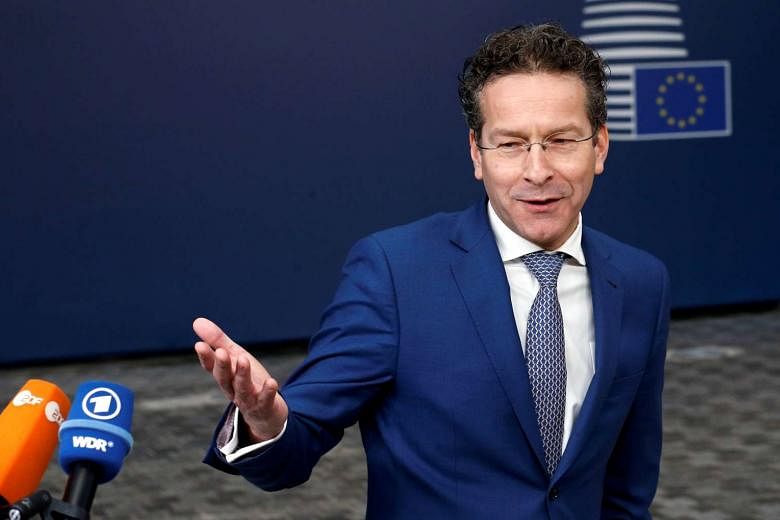BRUSSELS (AFP) - Eurogroup chief Jeroen Dijsselbloem faced mounting calls to resign Wednesday (March 22) as a row escalated over his "racist" comments that southern European countries blew their money on "drinks and women".
Portugal's prime minister and former Italian premier Matteo Renzi led pressure on Netherlands finance minister Dijsselbloem, already reeling from last week's election setback in his homeland.
"If Europe were serious, Dijsselbloem would be already sacked," said Portuguese premier Antonio Costa in comments that underlined how Dijsselbloem's gaffe has exposed simmering north-south tensions within the European Union's single currency zone.
"It is unacceptable that someone who behaves ... with such a racist, xenophobic and sexist attitude towards some European countries remain as head of the Eurogroup", the socialist Costa said in Portugal at a football event.
"The sooner he goes the better," Italy's Renzi in a post on his Facebook page that reflected criticism from across the EU's so-called Club Med group of countries.
"He has missed a perfect opportunity to shut up," Renzi said. "If he wants to offend Italy he should do it at his local sports bar, not in his institutional role."
Dijsselbloem saw backing from political allies evaporate as a result of an interview that appeared in Germany's Frankfurter Allgemeine Zeitung newspaper on Monday (March 20).
"During the euro crisis, the countries of the north of the eurozone showed solidarity with the countries in crisis," he was quoted as saying.
"For me, as a social democrat, I think that solidarity is extremely important. But whose who benefit also have duties," he added.
"I can't spend all my money on drinks and women and then ask for help."
Dijsselbloem, 50, holds one of Europe's most influential positions, chairing the meetings of finance ministers from the 19-country eurozone. But his job was already up in the air after his party lost out in elections last week.
Dijsselbloem refused to apologise late Tuesday. "No, certainly not," he told a European Parliament lawmaker during a hearing when asked if he would say sorry.
'Clogs, Tulips and Windmills'
Mediterranean countries Portugal, Greece and Cyprus have all received eurozone bailouts in recent years - as has Ireland in northern Europe - while Spain's banks have also received support.
Waiting in the wings to replace Dijsselbloem is Spanish Finance Minister Luis de Guindos, who is both from a southern country and a member of the European People's Party, the party of Germany's Wolfgang Schauble, the most powerful minister in the Eurogroup.
Dijsselbloem's comments are "unfortunate in both style and content," de Guindos told reporters in Madrid.
"I don't think (bailed out) Portugal, or Greece plundered public funds, nor Cyprus or Ireland," he added.
Powerful German MEP Manfred Weber of the European People's Party fired his own warning shot to Dijsselbloem: "Eurozone is about responsibility, solidarity but also respect. No room for stereotypes."
The row was a top story on Italian news bulletins Wednesday as commentators rounded on a politician already regarded with suspicion because of what are seen as his hawkish views on the application of EU budget rules to Italy.
Corriere della Sera daily said Djisselbloem's comments should cost him his role.
"One would have thought that in Amsterdam they know a thing or two about pubs and brothels, even spending their loose change in their coffee shops," the broadsheet said in a reference to the Netherlands' legal cannabis cafes.
La Stampa also mocked the Dutch politician's use of what it termed tired old stereotypes. Noting that he had refused to apologise, the Turin daily said Djisselbloem "then pulled on his clogs and went back to his marvellous windmill in a field of tulips."
Dijsselbloem is set to lose his job as Dutch finance minister in the coming months after his Labour party suffered heavy losses in the Netherlands' general election.
But his mandate as head of the Eurogroup lasts until January 2018 and EU rules do not specify that the person holding the position must actually be a finance minister.
He has won praise for steering the eurozone through part of its seemingly never-ending debt crisis, but there have long been tensions in the single currency area between austerity-pushing northern countries and the debt-hit south.

